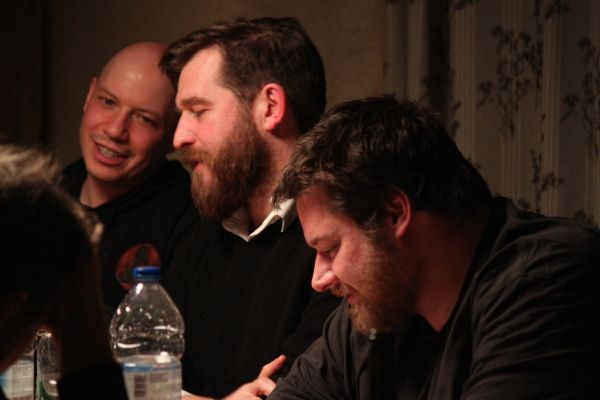Eye For Film >> Movies >> Lost In France (2016) Film Review
Lost In France
Reviewed by: Andrew Robertson

Lost In France is such a personal film, such an intermittently delicate portrait of a particular kind of ageing, such a warm-hearted exercise in reminiscence, a literal revisiting, that it seems unfair to talk about it without being personal. So I won't.
Eighteen-odd years ago, a group of people affiliated with Glasgow Indie label Chemikal Underground went to Mauron, a wee town in France, and played at a music festival there. Some of them went back, last year - 2015 - indisputably older, in some cases significantly more successful, broadly wiser, generally nostalgic. Except it's not fair to call it nostalgia, that's a term that's tinged with more than sepia. There's a distance between romanticising the past and remembering bits of it fondly, and Niall McCann's film charts that course well. It's observed that things are always better on holiday, and though the original trip wasn't the Sex Pistols at The Lesser Free Trade Hall, it is perhaps Temba, his arms wide - meaning for those who can recognise.
At one point there's a discussion of Glasgow's post-Industrial legacy, in an office that's in one of those bits of the world from which one can see Parkhead, talk of sound techs on aeroplanes to Japan, of Top Of The (fucking) Pops, of a music industry that has itself left artifacts across a city, now unused, now unseen. Glasgow Film Festival makes much of the Second City of Empire's history as a cinema city, but before the clarion call of kino was the draw of music hall - even now names that are iconic, King Tut's Wah Wah Hut, the Barrowlands, the 13th Note. Spaces that are seen in Lost In France: spaces in which Greater-Glaswegians of a certain age, of a certain mein, the kind of people who have 'good Converse', more than one T-shirt that draws heavily from the cover of an album but is not that album cover, spaces in which those people are found; spaces in which you, I, will find yourself craning your neck to see who you know there, to recall where you have seen gigs yourself, where you have ordered a midnight lemsip, where bands were formed and grew and alternately exploded and imploded and set up their own record labels.
Aided by a tremendous soundtrack - live performances, special performances, LPs with their CU catalogue numbers - powered by interviews, holiday snaps, text on the screen like pull-quotes, it sometimes rattles along, sometimes meanders, that whole loud bit quiet bit shoe-gaze rock-out sine wave sensibility. It's a visit to an era that's gone - a contrast made stark not by discussions of coach-trips in those last days before the ubiquity of mobile telephony, of that era before the air was filled with no-frills carriers, a contrast made in a technological gap. Stuart Braithwaite of Mogwai tells of a photograph, proper down to Boots developed and handed back a week later Polaroid 90 percent market share of photo paper rectangular evidence, a photograph of the name of the song from the EP that they sent to Radio 1 and was on the CEEFAX page that contained the track-listing for a John Peel programme. Elsewhere, Alex Kapranos of Franz Ferdinand (but perhaps more importantly Karelian) sits with a MacBook of some slim white stripe with a Facebook page open and then plays a video (maybe off YouTube?) to Paul Savage off of the Delgados to figure out a drum bit, and behind them an unlit wood stove sits brooding. It's not the same now, a theme to which the film returns like a chorus.
There's a discussion of the dole, of free time, of the joys of being in a band, of being near a band, of liking bands, of liking things, of having fun. Time passes, even in the film - one closely edited rambling reminiscence has beneath it a punctuating pictorial percussion of a glass of lager being consumed and refilled off-screen, the drinking unseen. This is like finding old photos in the cupboard, being prompted to remember.
I went to a wedding once, somewhere near Hackney, maybe actual Hackney, and as with Scots everywhere there was dancing, drinking, and the reception was in a wee pub, well, a wee upstairs room, and the floor was sticky enough to have a measurable ABV and probably old enough to have picked sides in at least two non-Marvel civil wars and something of that mid-Nineties Evening Session milieu came on and as Steves Lamacq found their Jos Whiley to pas de deux, the structure itself began to grumble and quake and I joked to another 'good Converse' wearing guest that if the boards beneath our feet gave way we would become a statistically significant drop in the listenership of 6music. We laughed. There's nobody who was at that wedding to whom I would not commend this documentary, and that's in part because what was an exercise in going to the past for those within the documentary became one for me. It would be for a certain set of folk, a generation slightly older than mine - I drank in these places (albeit later), went to school with the little sisters of some of these people, worked some of these doors, listened to some of these Peel Sessions, had some of these tracks on MiniDisc, went home and dug some of this out. Enjoyed myself. You might too. If you've recognised even one name in this list you probably will.
Reviewed on: 17 Jun 2016
















